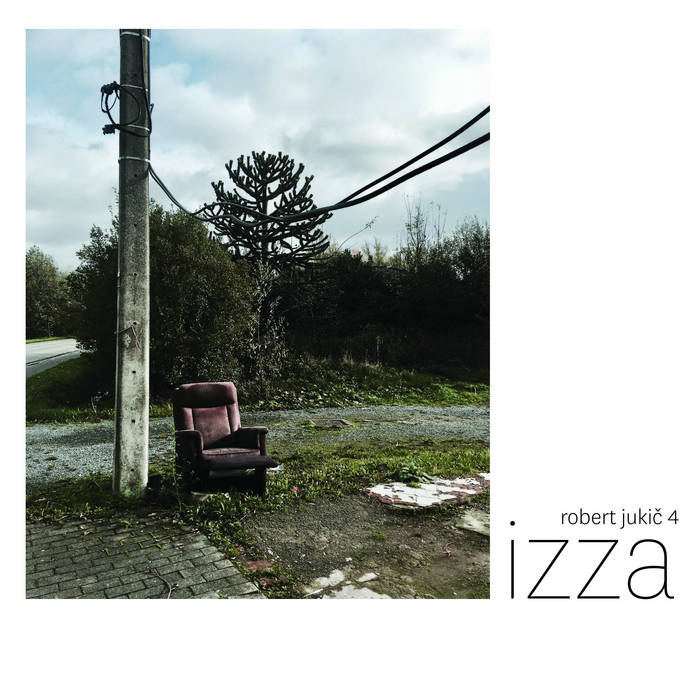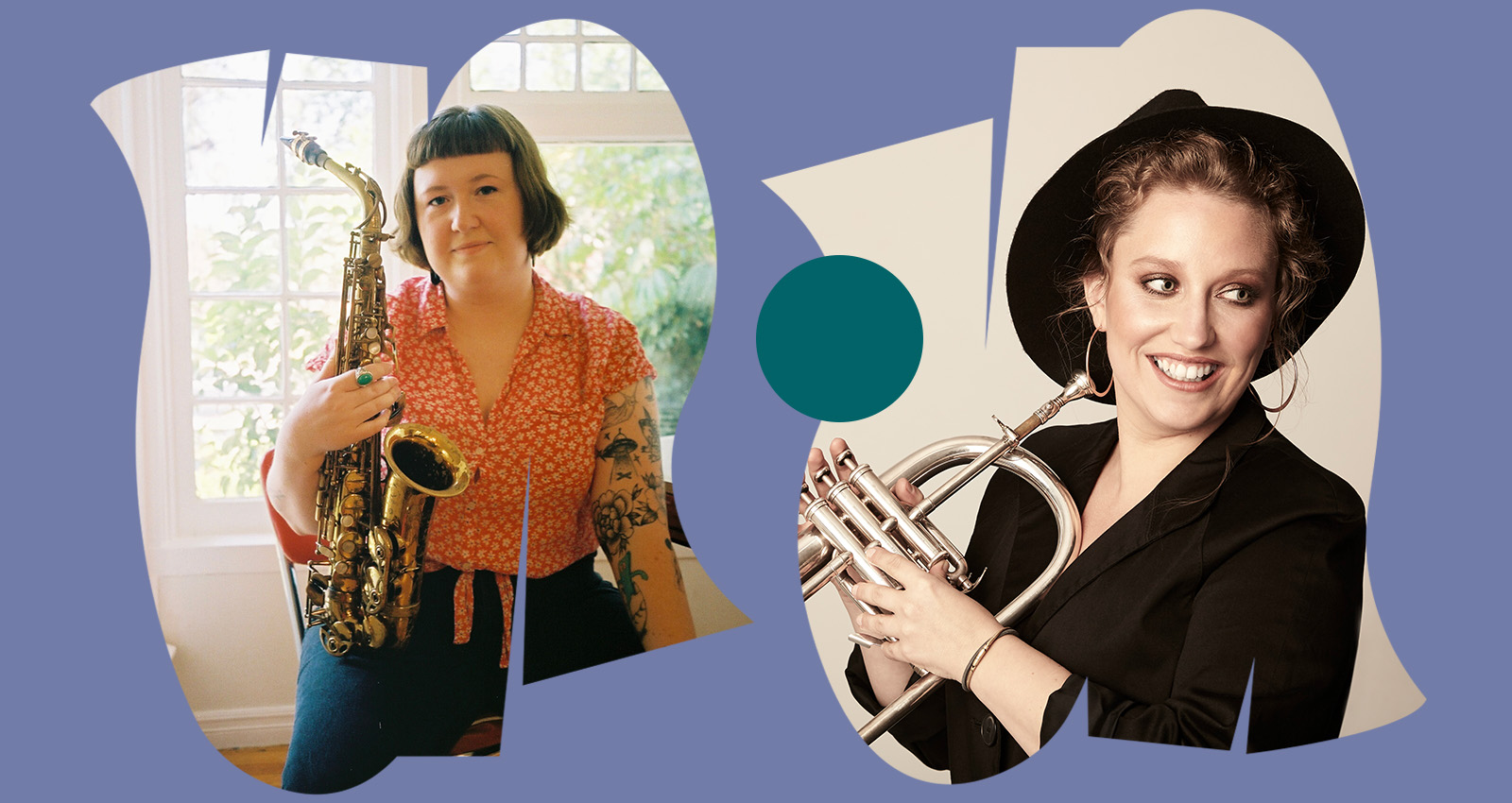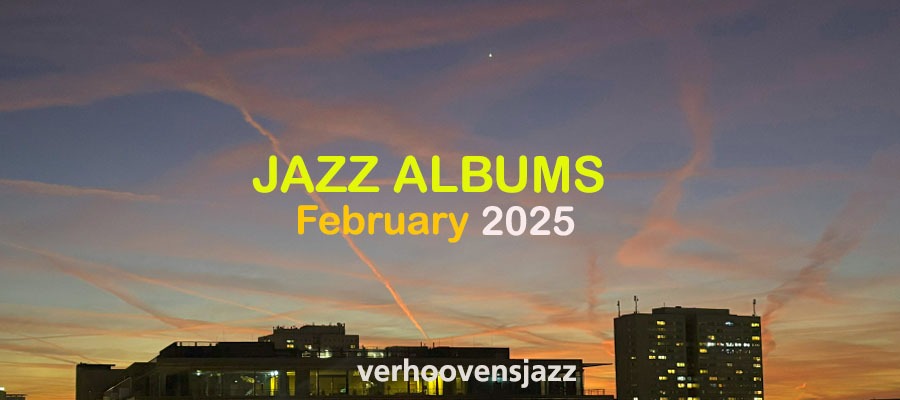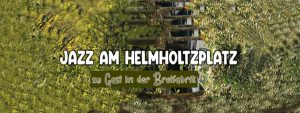
Robert Jukič Izza
Robert Jukič bass, compositions | Bostjan Simon (saxophone) | Tomaž Gajšt (trumpet), Kristijan Krajnčan, drums – Release 16. May 2022
„Nichts zu sagen und es mit der Zeit reifen zu lassen, ist in Ordnung, wenn man es sich leisten kann. Aber wir hatten dieses Privileg nicht – wir hatten nur begrenzte Proben- und Studiozeit, andererseits gibt uns das einen Vorteil und wir sind gezwungen, die Kontrolle loszulassen und Risiken einzugehen.“ Robert Jukič
Robert Jukič, Bassist aus Slowenien, studierte in Graz, lebt in Brüssel, weist mehr als fünfzehn Aufnahmen auf, genreübergreifend von der slowenischen Tradition über Filmmusiken bis hin zum Blues, Rock und Jazz, dem er sich verschrieben hat, seit er ein Instrument in die Hand genommen hat, erst die Gitarre, schließlich E-Bass, heute überwiegend Kontrabass.
Im Gespräch kommst du schnell zum Kern der Sache, Robert Jukič spielt nicht nur des Spielens wegen, er durchdringt sein Spiel auch auf konzeptionell ästhetische Art, oder wie er selbst sagt:
„Worte sind nicht nur Worte. Ich glaube fest an die Macht der Worte, meine Musik ist einfach nur Musik, und obwohl die Worte ihre Berechtigung haben, muss ich sagen, dass es für mich und die Musiker im Prozess des Komponierens und Aufnehmens einen großen Unterschied macht, Worte, ihre Bedeutungen und Ideen dahinter zu sehen. Wir haben die Tinte auf dem Papier gelesen, haben aber das gespielt, was dahinter steht. Oder zumindest haben wir unser Bestes gegeben, um uns ehrlich zu machen.“
Das ist, was auch bei der vorliegenden Aufnahme Izza überzeugt: solltest du jemals versucht sein, Zweifel zu haben, warum du dies, warum du das, warum du überhaupt etwas sagst, so fehlt dir eine der wichtigsten Komponenten im Zusammenspiel und im Gespräch der Menschen:
das Zuhören. Das Hinhören. Gehst du gleich mit Verve in ein Gespräch, überhörst du die Töne, Nuancen und Interferenzen – du darfst dich auf dein Gegenüber schon noch auch einlassen.
Die beiden letzten Aufnahmen, Izza und auch Caminos de Gloria sind gefüllt mit Interaktion, dem Um- und Miteinander, dem Wechselspiel der Meinungen, dem Austausch von inneren Unstimmigkeiten und verlautbarten Halbwahrheiten, dem Versuch, zwischen den Farben Schwarz Weiß oder Gut und Böse zu vermitteln in jene Bereiche hinein, da das Abwarten, das Interagieren, das Zuhören beginnt.
Im ersten Moment wirkt die Aufnahme Izza wie ein Monolit, eine reife Leistung, eine Skulptur aus Musik und Stimme, ein in sich stimmiger Block, gehst du als Zuhörer auf die einzelnen Werke ein, erschließen sich dir mehr noch die inneren Botschaften.
Aus den auch Sloweninnen und Slowenen kaum bekannten aber von Jukič verwendeten Worten – solzice onkraj für „kleine Risse“ oder skrunitev sledi für „Spuren von Schändung“, stezice izza für „Pfade dahinter“, zlahka skoraj = fast mit Leichtigkeit – lässt sich gut ablesen, in welchem Balanceakt das Arbeiten an der Musik mit dem Spiel in der Musik stattfindet, wenn du etwas willst und es aber anders kommt, oder:
wenn du einfach keine Zeit findest, weil du überall zu spät bist, oder: du nicht mal eine Übersetzung findest für etwas, was sein will oder offensichtlich ist: n kot narod. ali noj p for people. or ostrich (obviously impossible to translate, people (volk) and ostrich (Strauß) start with the same letter in Slovenian)
Robert Jukič fasst es so zusammen:
„IZZA hat Titel, die aus Wörtern bestehen, die nicht so gebräuchlich sind, einige von ihnen werden selten verwendet und sind dem Durchschnittsslowenen nicht bekannt. Ich mag ihre Einzigartigkeit und die Kraft, die ihnen innewohnt. Ich habe sie zusammengesetzt und dann diese Konstrukte benutzt, um Linernotes zu schreiben, die ein Kommentar zur Zeit von März 2020 bis zum 24. April 2022 (Wahlen in Slowenien) sind.“
Anderes Beispiel: eine Assoziationskette entsteht in nur einem Satz: drhal.sodrga.svinje.biseri. v gore mob lowlife swines pearls to the mountains (Deutsch: Pöbelschweine, Perlen, zu den Bergen) Das lässt sich beliebig fortführen. Das führen Robert Jukič und seine Begleiter auf höchstem Level und immer stimmungs- wie spannungsvoll zusammen.
Es ist eine Aufnahme IZZA (2022) entstanden, die wie schon Caminos de Gloria (2021) ein hohes Maß an kommunikativen Elementen beinhaltet und dabei nicht abdriftet in einen für Freejazz oft erlebbaren Selbstbezug, sondern fein abgestimmt fast schon familiäre Züge trägt, obwohl oder gerade weil die Themen größer, höher, umfassender angelegt sind.
Robert Jukič zu Caminos de Gloria:
„Das Grundthema von „Caminos de gloria“ ist meist der Kampf zwischen Gut und Böse, die dunkle Seite der Menschheit, eine Art Skizze von Sarkasmus, Nihilismus, Ironie, Konzentrationslagern und ähnlichen Zeugnissen der Menschen, die Geschichten drum herum, aber auch Visionen von Hoffnung und Triumph. Es herrscht immer Krieg. Als ich 2017/18 komponiert habe, hatte ich das Gefühl, dass ein Krieg bevorsteht. Der Titel (Paths of glory) und die Namen der Songs wurden 2021 in der letzten Phase nach den Aufnahmen und dem Mixing ausgewählt. Die Platte ist am 21. September erschienen.“
Die Songliste ist als Haiku plus 1 Strophe aufgebaut:
Im Original: Spet pada listje / Od molka oglušeli / Sneg bo znova rdeč / Le glejte stran
Übersetzt heißt es: Spet – Again Pada – Are falling – Listje Leaves Wieder fallen die Blätter | Od – By Molka – Silence Oglušeli – Deafened von ertaubender Stille oder ertaubtem Schweigen | Sneg – Snow Bo – will be Znova – again Rdeč – red Der Schnee wird wieder rot sein | Le – Just Glejte – look Stran – away Schau du nur weg
Noch einmal und wieder, es ließe sich unendlich wiederholen in diesen turbulenten Zeiten der Faktenchecks und des Aufmerksamkeitswahns, bei all den Versprechungen, dem Aufkeimen nationalkonservativer und repressiver Ideen, der Übertretung von Grenzen – wieviel Luft, wieviel Mythos, wie viel Übertreibung und Religion in den Worten steckt, in den Phrasen und Sätzen, wie viel Bauchgefühl und wie viel Wut, wie viel Rechthabenwollen und wie viele Märchen, Träume, Schäume…
Da tut es Not und in der Not tut es gut zu wissen und zu hören, dass nicht das Megaphon entscheidet oder das hektische Rennen ums Goldene Kalb, nicht die sichtbare Verfestigung repressiver Strukturen, nicht das Mysterienspiel um Volksgeist und Seele, nicht das Pathos der Lehre, die schnell zur hohlen Geste verkommt – mit Pomp und Gloria,
im Gegenteil, mit den Worten Robert Jukičs gesagt, klarer kann man es nicht ausdrücken:
„Vielleicht braucht man nichts mehr auf dieser Welt, aber ich muss trotzdem Musik machen. Sie ist meine Meditation, eine Art Reinigungsprozess, sie ist mein gewähltes Kommunikationsmittel, und es gibt Dinge, die gesagt werden müssen, auch wenn niemand zuhört, und sei es nur, um mich besser zu fühlen oder weil ich dadurch für einen Moment ein besserer Mensch werde.“
Ein Album, das ich allen ans Herz lege, die sich die Zeit nehmen – auch wenn sie abhanden zu kommen scheint – aufeinander zu hören, sich nicht nur zu exaltieren, sondern gleich auch zu verstehen versuchen. Eine Aufnahme, die sich bei mehrfachem Hören erst zeigt in ihren Facetten und ihrem Umfang an Assoziationen und Hinweisen.
Eine Punktlandung und davon gerne mehr.

by Robert Jukic
Robert Jukič Izza :
References:
Robert Jukič bass, compositions | Bostjan Simon (saxophone) | Tomaž Gajšt (trumpet), Kristijan Krajnčan, drums – Release 16. May 2022
English Version Robert Jukič Izza :
„Saying nothing and let it mature over time is fine, if you can afford it. But we didn’t have that privilege, on the other hand it gives us the edge and we’re forced into letting go of control and taking risks..“ Robert Jukič
Robert Jukič, bassist from Slovenia, studied in Graz, lives in Brussels, boasts more than fifteen recordings, spanning genres from Slovenian tradition to film scores to blues, rock and jazz, to which he has devoted himself since he picked up an instrument, first the guitar, eventually electric bass, now mostly double bass.
In conversation you quickly get to the heart of the matter, Robert Jukič doesn’t just play for the sake of playing, he also infuses his playing in a conceptually aesthetic way, or as he says himself:
„Words are not merely words. I strongly believe in the power of words, my music is just music, and although the press-release words are there for it’s own reason etc., i must say that in the process of composing and recording it made a huge difference to me and the musicians to have words, their meanings and ideas behind them. We did read the ink on the paper, but we played what’s behind. Or at least we gave it our best honest shot.“
That’s what’s also compelling about this recording Izza: should you ever be tempted to have doubts about why you’re saying this, why you’re saying that, why you’re saying anything at all, you’re missing one of the most important components in human interaction and conversation:
The listening. Listening! If you go into a conversation with verve right away, you overhear the tones, nuances and interferences – you are still allowed to engage with your counterpart.
The last two recordings, Izza and also Caminos de Gloria, are filled with interaction, the togetherness, the interplay of opinions, the exchange of inner disagreements and proclaimed half-truths, the attempt to mediate between the colors black and white or good and evil into those areas where waiting, interacting, listening begins.
In the first moment the recording Izza seems like a monolith, a mature performance, a sculpture of music and voice, a block coherent in itself, if you as a listener go into the individual works, even more the inner messages open up to you.
From the words – solzice onkraj for „small tears“ or skrunitev sledi for „traces of desecration“, stezice izza for „paths behind“, zlahka skoraj = with ease almost – which are hardly known even to Slovenians, it is easy to see in which balancing act working on the music with playing in the music takes place, when you want something but it comes differently, or:
when you just can’t find time because you are late everywhere, or: you can’t even find a translation for something that wants to be or is obvious: n kot narod. ali noj p for people. or ostrich (obviously impossible to translate, people (volk) and ostrich (Strauß) start with the same letter in Slovenian)
Robert Jukič sums it up like this:
„IZZA has titles constructed of words that are not so common, some of them are rarely used and not known to an avarage slovenian. I like their uniqueness and the power they hold. I’ve put them together and then used these counstructs to write liner notes which are a commentary of the time from march 2020 until April 24.2022 (elections in slovenia).„
Other example: a chain of associations arises in just one sentence: drhal.sodrga.svinje.biseri. v gore mob lowlife swines pearls to the mountains (German: Pöbelschweine, Perlen, zu den Bergen) This can be continued at will. Robert Jukič and his companions bring it all together at the highest level and always in a moody and exciting way.
The result is a recording IZZA (2022), which, like Caminos de Gloria (2021), contains a high degree of communicative elements and does not drift into a self-reference often experienced in free jazz, but rather bears finely tuned, almost familiar traits, although or precisely because the themes are larger, higher, more comprehensive.
Robert Jukič on Caminos de Gloria:
„The underlying theme of „Caminos de gloria“ has mostly been connected to the battle between good and evil, to humanity’s dark side, a sort of sketches of sarcasm, nihilism, irony, concentration camps and similar achievements of men, the surrounding stories, but also visions of hope and triumph. There’s always war going on. I’ve had a feeling of a war approaching when i was composing back in 2017/18. The tittle (Paths of glory) and the name of the songs have been chosen in 2021 in the last stage after recording and mixing. The record came out in september 21.“
The song list is constructed as a haiku plus 1 verse:
In the original: Spet pada listje / Od molka oglušeli / Sneg bo znova rdeč / Le glejte stran.
Translated it means: Spet – Again Pada – Are falling – Listje Leaves : Again falling the leaves | Od – By Molka – Silence Oglušeli – Deafened by deafened silence or by deafened silence | Sneg – Snow Bo – will be Znova – again Rdeč – red The snow will be red again | Le – Just Glejte – look Stran – away Just look away
Once again and again, it could be repeated endlessly in these turbulent times of fact checks and attention mania, with all the promises, the germination of national conservative and repressive ideas, the transgression of borders – how much air, how much myth, how much exaggeration and religion are in the words, in the phrases and sentences, how much gut feeling and how much anger, how much wanting to be right and how much fairy tales, dreams, or nightmares,
It is necessary, and in times of need it is good to know and to hear that it is not the megaphone that decides or the hectic race for the golden calf, not the visible consolidation of repressive structures, not the mystery play about the people’s spirit and soul, not the pathos of teaching that quickly degenerates into a hollow gesture – with pomp and glory,
On the contrary, in Robert Jukič’s words, it cannot be expressed more clearly:
„Perhaps there’s no need for anything in this world anymore, but still I have to make music. It’s my meditation, a cleaning process of sorts, it’s my chosen tool of communication, and there’s things that need to be said even if noone is listening, if only to feel better or just because it makes me a better human being for a moment.„
An album that I recommend to all those who take the time, even if it seems to be lost, to listen to each other, not only to exalt, but also to try to understand at once. A recording that only reveals itself in its facets and its scope of associations and clues with multiple listenings.
A precision landing and from this gladly more.










